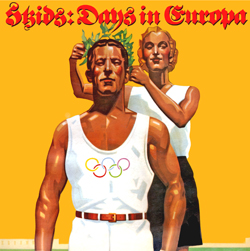Top Qs
Timeline
Chat
Perspective
Days in Europa
1979 studio album by Skids From Wikipedia, the free encyclopedia
Remove ads
Days in Europa is the second album by Scottish punk rock and new wave band Skids. It was released in 1979 by record label Virgin.
Remove ads
Writing
Track #3 on Side 1 is 'Dulce et Decorum Est (Pro Patria Mori)'. A rough translation is "It is a sweet and glorious thing (to die for one's country)". Dulce et Decorum Est is a poem by Wilfred Owen.
Track #3 on Side 2 is Thanatos, the Greek word for "death" and the name of the ancient Greek god of death. It is used in Freudian psychology to refer to the death wish/destructive urge, as opposed to Eros, the reproductive urge.
The album features lyrical references to both World War I and World War II.
Remove ads
Reception
Days in Europa has received a generally mixed response from critics. Ira Robbins of Trouser Press wrote: "In polishing and refining the band's sound even a little, [producer Bill Nelson] smoothed off the vital edge."[4] The Globe and Mail noted that "the record is new wave in tone, with some heavy metal tendencies."[5]
Remove ads
Track listing
Summarize
Perspective
All tracks are written by Richard Jobson and Stuart Adamson, except "Home of the Saved", written by Adamson.
1980 re-release
Personnel
- Skids
- Richard Jobson – vocals
- Stuart Adamson – guitar, vocals, keyboards
- William Simpson – bass guitar, vocals
- Additional personnel
- Rusty Egan – drums
- Bill Nelson – keyboards
- Thomas Kellichan – drums on "Masquerade" (second version only)
References
External links
Wikiwand - on
Seamless Wikipedia browsing. On steroids.
Remove ads


